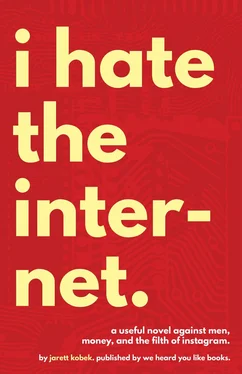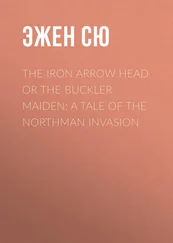Again, the chapter missed its mark by not extending the argument to its logical end-point.
It didn’t suggest that most educated White people, by virtue of their interaction with consumer electronics built by slaves, demonstrated that they didn’t believe in inclusion or fairness or justice. Fifty years ago, they had been ignorant in their unexamined racism and now they were ignorant in their unexamined anti-racism. They could switch back at any time. Expressing concern about racism was a new religion and focusing on language rather than political mechanics was an effortless, and meaningless, way of making sure one was seen in a front-row pew of the new church. They prayed not from any hard earned process of thought or genuine faith but because failing to bow and scrap before the shibboleths of the moneyed political Left might hurt their job prospects.
And poor job prospects meant less money to buy consumer electronics built by slaves.
There was also some discussion about how people were still saying %&$#?@ as much as ever, but now they employed a euphemism to indicated %&$#?@. This euphemism was The N-Word.
When the opposing attorney deponed Paula Deen, he didn’t ask her if she had said %&$#?@.
He asked her if she had said The N-Word.
Anyway, the chapter’s fatal flaw was that it couldn’t tie these ideas together. They were wispy threads of an unwoven tapestry.
Another flaw of equal significance was that this chapter didn’t link America’s treatment of its minorities with the comic book industry’s treatment of people like Jack Kirby, and finally, with the way that the Internet preyed on the gullible, asking them to create content based on inflamed emotion for the sake of serving advertisements.
Jeremy Winterbloss’s ancestors were enslaved on the basis of their ability to provide free labor. The fruits of this labor were never shared with Jeremy’s ancestors. His ancestors were property. Property can’t own other property.
The American comic book industry had paid its employees for their labor but stole its fruits. Jack Kirby lost ownership of his creations, which were worth billions of dollars.
It was the greatest theft of intellectual property in history.
With the Internet, people produced reams of intellectual property over which they had no control. If you sent a message to someone on Facebook, Facebook owned that message for all time, and used it as the pretext for serving advertisements. Your expressions of outrage about Paula Deen and %&$#?@ made money for Mark Zuckerberg and his investors.
The curious thing was that Facebook and Twitter and Tumblr and Blogspot, a media platform owned by Google, were the stomping grounds of self-styled intellectual and social radicals. It was where they were talking. It was where, they believed, the conversation was shifting.
They were typing morality lectures into devices built by slaves on platforms of expression owned by the Patriarchy, and they were making money for the Patriarchy. Somehow this was destroying the Patriarchy.
So there’s always hope.
The illusion of the Internet was the idea that the opinions of powerless people, freely offered, had some impact on the world. This was, of course, total bullshit and based on a crazy idea of who ran the world.
The world was not run by its governments. The world was not run by its celebrities.
The world was run by its bankers. The world was run by its investor class. The world was run by its manufacturers. The history of human destiny was money , the men who controlled it, and nothing more.
Money, a measure of humiliation, was the only thing that mattered.
The illusion of opinions, freely offered, was encouraged because it made money for bankers. It made money for investors. It made money for manufacturers, who enslaved the citizens of far off nations to build the devices required for the free offering of opinions.
The one thing that freely offered opinions did not do, at all, was change the world. Opinions were only more words, only more shit that someone somewhere made up, and words were grease in the gears of capitalism.
Words were lubrication for a complex process that, every forty years, replaced one group of men who talked like they had paper assholes with another group of men who talked like they had paper assholes. Jarvis Cocker was right all along. Cunts really are still running the world.
Words were not power. Take it from a professional writer. The only place where words have power are scrawled on a bathroom wall.
The only effect of the words of powerless people on the Internet was to inflict misery on other powerless people.
When you need to defeat the hand, make the fingers attack each other.
Divide and conquer.
Anyway, Adeline did it.
She tweeted about %&$#?@.
At last, she had learned how to use the Internet.
J. Karacehennem was in Denmark. He was a foreign writer in residence at Hald Hovedgaard, an old manor house built during the Eighteenth Century.
It was nice but boring. The other foreign writers were delightful. The Danish women writers were all lovely. None of the Danes had a hint of eumelanin in the basale strata of their epidermises.
The Danish male writers were horrible, except for Ole Tornbjerg, a crime writer who wrote books with his wife. Ole Tornbjerg was lovely.
Late in his visit, J. Karacehennem would meet Jussi Adler-Olsen, who had mastered the art of writing Scandinavian crime fiction, a subgenre in which squalid tales written by secular humanists reaffirm the Christian doctrine of original sin.
Jussi-Adler Olsen’s crime novels were translated into countless languages and were huge sellers everywhere.
Jussi Adler-Olsen said that he’d sold 900,000 books in English.
J. Karacehennem was waiting for a local bus. He was going to the nearby town of Viborg. Viborg was one of the oldest cities in Denmark. It was very boring but had an atmospheric medieval section and an excellent cathedral boasting some very gaudy frescoes.
The bus stop was located across the street from the manor house in which J. Karacehennem was staying.
As J. Karacehennem waited for the bus, Brane Mozetič, a Slovene poet without much eumelanin in the basale stratum of his epidermis, walked out of the manor house. Brane Mozetič rushed over to the bus stop.
The bus pulled up.
J. Karacehennem and Brane Mozetič sat together.
They talked about the weather. They talked about Denmark.
Brane Mozetič said to J. Karacehennem, “Tell me, you are from California?”
“I used to live in Los Angeles,” said J. Karacehennem, “I moved to San Francisco. So I guess I’m from San Francisco. Los Angeles feels more like home.”
“San Francisco,” said Brane Mozetič. “Do you know Kevin Killian?”
Adeline received a text from Jeremy Winterbloss. He was coming into the city. Adeline texted back.
She suggested that they meet at Coffee to the People.
Coffee to the People was in the Haight.
The Haight was one of the last places in the city with an actual mix of the social classes. There were rich people, there were middle class people, there were poor people.
All wandering half-dazed. Navigating crappy stores packed with hippie kitsch. Everything was covered in a layer of filth.
Coffee to the People was on Masonic. Adeline thought there might be some collectivist ideology embedded in the cafe. She wasn’t sure. It could’ve been just a name.
She took the N-Judah over to Cole. She didn’t pay her fare. She had lived in San Francisco for sixteen years and never paid, not once, for the N-Judah.
Читать дальше












